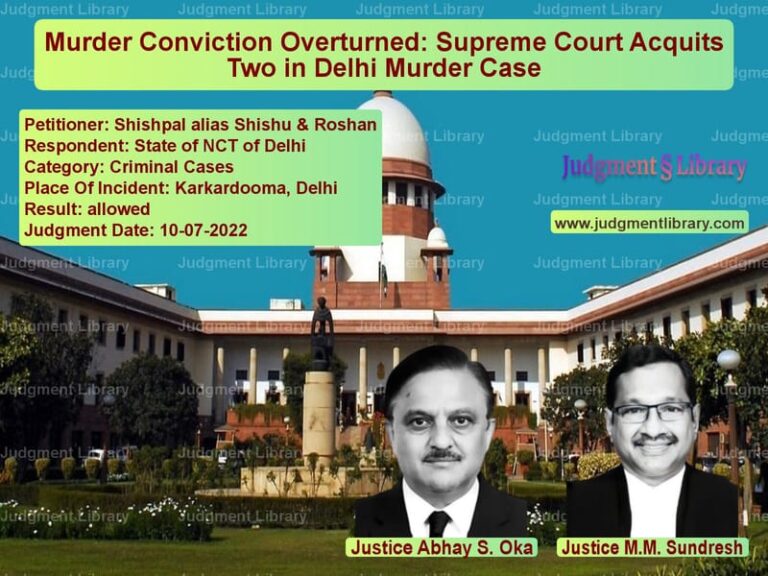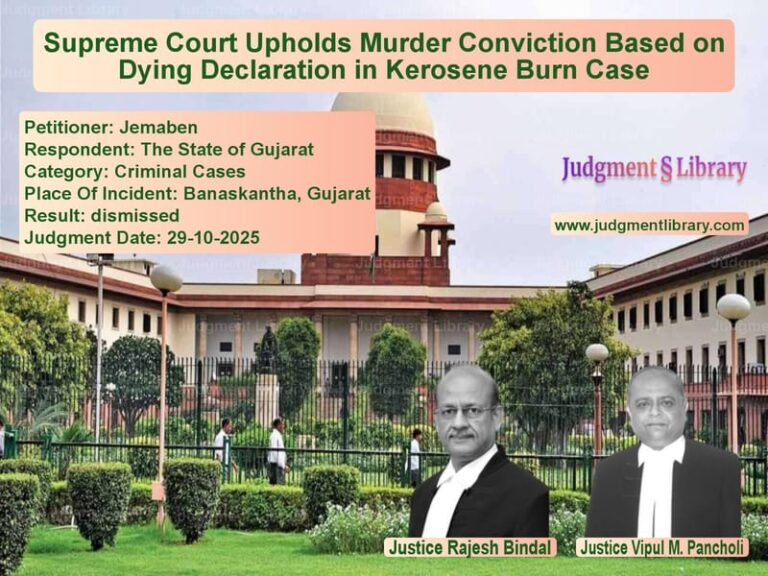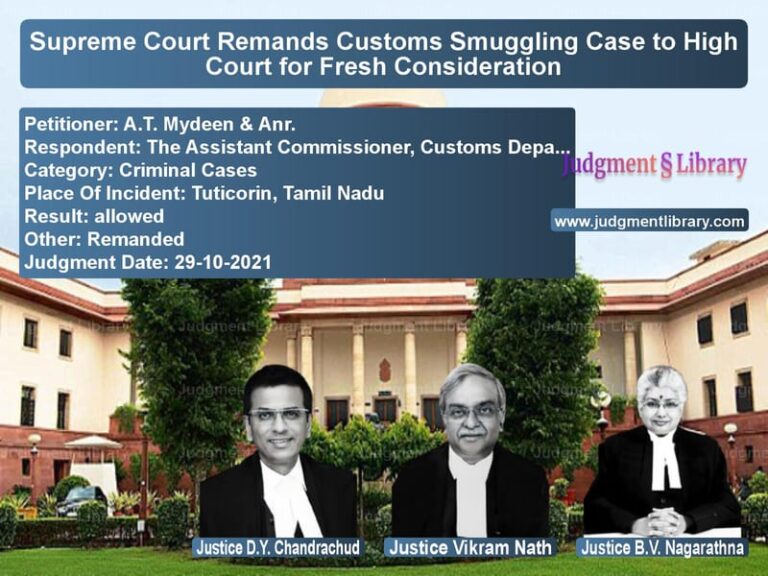Supreme Court Upholds Property Rights in Ceiling Surplus Land Dispute
The case of Tanu Ram Bora vs. Promod Ch. Das (D) through Lrs. & Others is a significant ruling by the Supreme Court of India concerning property rights in land declared as ceiling surplus. The judgment clarifies the application of the Transfer of Property Act, 1882, particularly Section 43, which protects the rights of transferees when property status changes after the sale.
Background of the Case
The dispute revolved around land that was initially declared ceiling surplus and later reclassified as ceiling-free. The appellant, Tanu Ram Bora, purchased the disputed land through a registered sale deed dated January 6, 1990. However, the land had been declared ceiling surplus in 1988, meaning it legally belonged to the government. Later, on September 14, 1990, the government revoked the ceiling surplus status, effectively making the land eligible for private ownership again.
Despite the mutation of land records in the appellant’s favor on December 18, 1991, the original defendant, an ex-police officer, entered the land and refused to vacate. This led the appellant to file a title suit in 1995, seeking declaration of ownership, eviction of the defendant, and a permanent injunction.
Legal Issues in the Case
- Whether the sale deed executed in 1990 was valid, given that the land was classified as ceiling surplus at the time of purchase?
- Whether Section 43 of the Transfer of Property Act protected the appellant’s ownership rights?
- Whether the lower courts erred in dismissing the suit?
- Whether the defendant had any right to remain in possession of the land?
Arguments Presented
Appellant’s (Tanu Ram Bora) Arguments
- The sale deed was executed lawfully, and the subsequent declaration of the land as ceiling-free validated the transaction.
- The government’s change in land status should apply retroactively, confirming the appellant’s ownership.
- The lower courts failed to consider Section 43 of the Transfer of Property Act, which protects transferees when a vendor later acquires ownership rights.
- The original defendant unlawfully occupied the land and had no valid claim.
Respondents’ (Promod Ch. Das & Others) Arguments
- The land was government property at the time of the sale, making the transaction void.
- The vendor had no right to sell the land, as it legally belonged to the government in 1990.
- Section 43 of the Transfer of Property Act did not apply because the transferor had no legitimate claim over the land at the time of sale.
- The plaintiff had no right to seek possession since the sale itself was invalid.
Supreme Court’s Observations and Judgment
1. Validity of the Sale Deed
The Supreme Court ruled that while the land was ceiling surplus at the time of sale, the later reclassification as ceiling-free meant the vendor ultimately had a valid title. The Court stated:
“Where a transferor fraudulently or erroneously represents ownership and later acquires valid title, the transferee’s rights are protected under Section 43 of the Transfer of Property Act.”
2. Application of Section 43 of the Transfer of Property Act
The Court emphasized that the principle of estoppel applied. Since the vendor later acquired ownership, the buyer (Tanu Ram Bora) could enforce his rights. The ruling stated:
“A subsequent acquisition of title by the seller benefits the purchaser, provided the contract of transfer remains valid.”
3. Defendant’s Illegal Possession
The Supreme Court rejected the defendant’s claim, ruling that:
- The defendant had no title to the property.
- He had unlawfully occupied the land.
- The appellant’s ownership was legitimate under the law.
The Court directed eviction of the defendant and upheld the appellant’s right to possession.
4. Errors in Lower Court Judgments
The Supreme Court found that the lower courts failed to apply the principles of the Transfer of Property Act correctly. It observed:
“The findings of the trial and appellate courts disregarded the legal protection offered by Section 43 of the Transfer of Property Act. The vendor’s subsequent acquisition of title automatically validated the sale.”
Final Judgment
The Supreme Court:
- Overturned the judgments of the lower courts.
- Declared the sale deed valid.
- Ordered eviction of the defendant.
- Granted ownership rights to the appellant.
Legal Implications of the Judgment
This ruling has significant implications for property law:
- Strengthens property rights: Buyers are protected even if the vendor acquires title later.
- Clarifies application of Section 43: Ensures fairness in cases where land status changes after sale.
- Prevents misuse of ceiling surplus laws: Limits government interference in private transactions.
- Upholds judicial accountability: Ensures courts correctly apply property law principles.
Conclusion
The Supreme Court’s ruling in Tanu Ram Bora vs. Promod Ch. Das (D) through Lrs. & Others reinforces the legal doctrine that a buyer’s rights remain intact if the seller later acquires title. This decision strengthens property law protections and prevents unjust enrichment at the buyer’s expense. The case serves as a guiding precedent for similar disputes, ensuring that legal transactions are honored and property rights are safeguarded.
Petitioner Name: Tanu Ram Bora.Respondent Name: Promod Ch. Das (D) through Lrs. & Others.Judgment By: Justice L. Nageswara Rao, Justice M.R. Shah.Place Of Incident: Assam.Judgment Date: 07-02-2019.
Don’t miss out on the full details! Download the complete judgment in PDF format below and gain valuable insights instantly!
Download Judgment: Tanu Ram Bora vs Promod Ch. Das (D) t Supreme Court of India Judgment Dated 07-02-2019.pdf
Direct Downlaod Judgment: Direct downlaod this Judgment
See all petitions in Property Disputes
See all petitions in Landlord-Tenant Disputes
See all petitions in Specific Performance
See all petitions in Judgment by L. Nageswara Rao
See all petitions in Judgment by Mukeshkumar Rasikbhai Shah
See all petitions in allowed
See all petitions in Quashed
See all petitions in supreme court of India judgments February 2019
See all petitions in 2019 judgments
See all posts in Civil Cases Category
See all allowed petitions in Civil Cases Category
See all Dismissed petitions in Civil Cases Category
See all partially allowed petitions in Civil Cases Category







